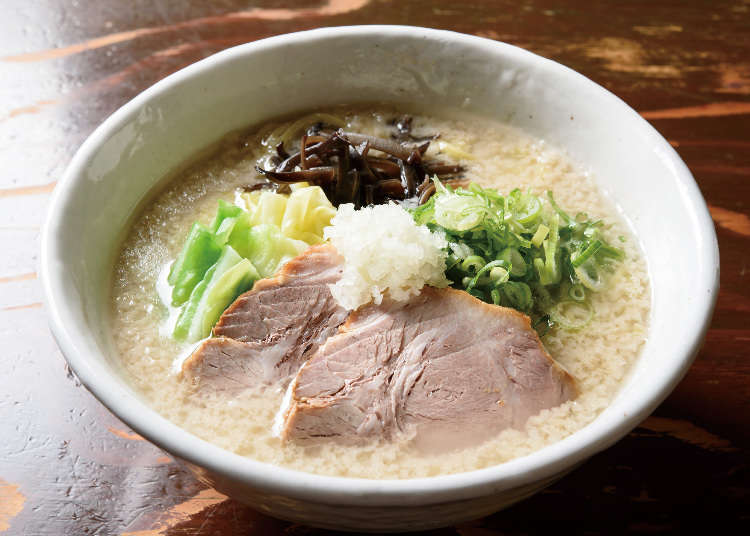
5 Places for Sapporo Ramen in Hiragishi, as Recommended by Local Ramen Connoisseurs
- Written by: Minna no Kotoba Sha
The birthplace of Sapporo Ramen trends is not just in the central area of Sapporo City. In this article, we’ll be checking out the regular haunts of lovers of Sapporo ramen, with the spotlight on the fierce battleground that is the Hiragishi area. We’ll be finding out more about the shops you should visit from local ramen experts.
The stores we will be introducing have measures against Covid-19 in place,
- Table of Contents
-
- The battleground of Sapporo ramen where popular shops are gathered
- The ramen connoisseurs who will be making recommendations
- 1. Sapporo Ramen Yamaarashi Main Shop: A food trend where you can clearly taste the lard
- 2. Men Dokoro Maruha BEYOND: Smooth noodles that slide down your throat, and soup thick with umami
- 3. Ramen Tsukemen NOFUJI: Soup brimming with the umami of pork and fish and extra-thick noodles for a lasting impression
- 4. Menya Kei: Umami created from carefully prepared prawn and miso to create ramen with a new taste
- 5. Wadashichūka SOBA Yamawasabi: A new flavor made by the marriage between traditional Japanese Washoku and ramen
The battleground of Sapporo ramen where popular shops are gathered
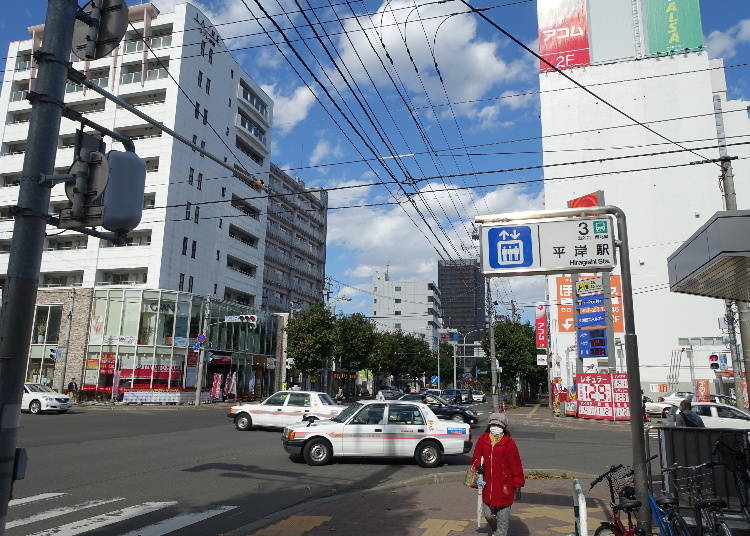
A little over 15 minutes away from Sapporo station via the Namboku line on the Municipal Subway, across the Toyohiragawa river out of the city's heart, is the Hiragishi area.
Apartment blocks line the streets neatly, and there are many shops for daily necessities and eateries, and it's a district known amongst locals for being easy to live in. In these streets, the ramen has a fierce and robust personality.
Having caught up on taste trends throughout the region, many famous shops that can be said to have improved on Sapporo ramen are gathered here. It's a famous area amongst ramen fans of Japan as the "Battleground of Ramen."
The ramen connoisseurs who will be making recommendations
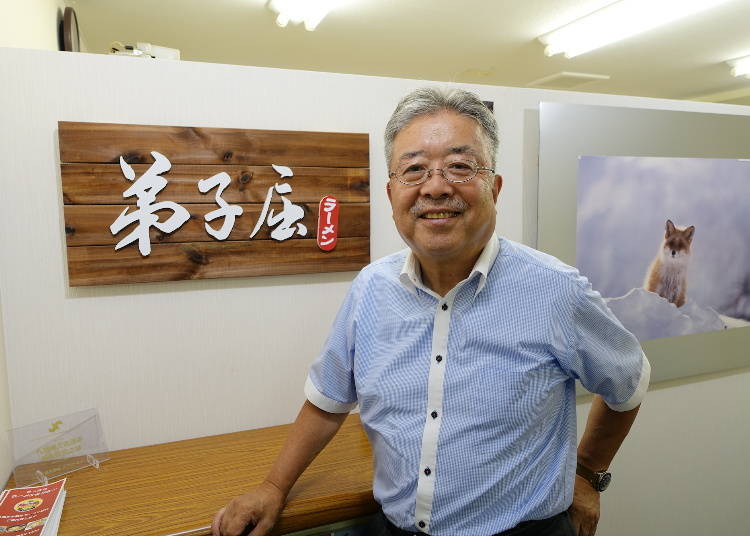
Sugahara Kenichi
Sapporo Ramen Club Representative/FBS Representative Board Member
Profile: I run the Sapporo Ramen Club website, which aims to bring together lovers of Sapporo ramen from across Japan! I am also vice-chairmen of the Sapporo Ramen Taxi’s executive committee, and I love participating in all kinds of ramen events! I seek to spread the flavor of Hokkaido through the Teshikaga Ramen chain.

Tada Nobuyuki
Editor-in-chief of Sapporo Ramen 1000
Profile: Beginning with Hokkaido’s ramen magazine, Ramen 1000, I have published numerous books and magazines exploring the world of ramen. I was also involved in the planning of Hokkaido Subscription, a Sapporo ramen delivery service available nationwide (https://hokkaido-shopping.com/)
1. Sapporo Ramen Yamaarashi Main Shop: A food trend where you can clearly taste the lard
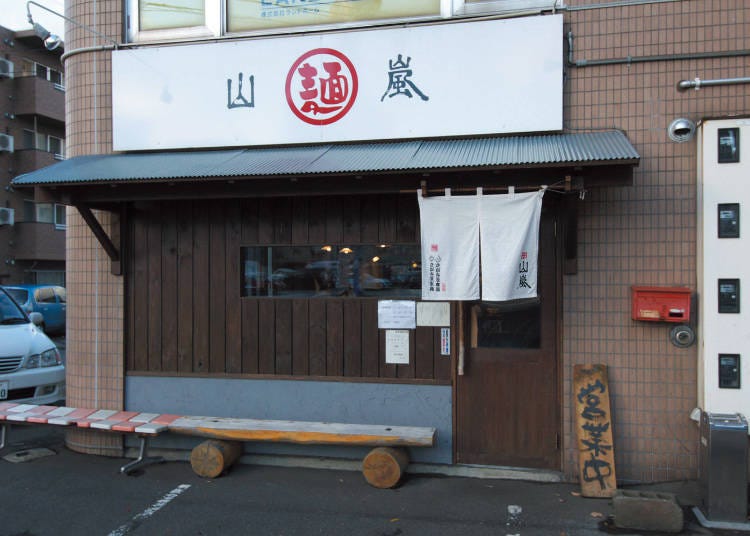
A ten-minute walk away from Hirakawa station is Sapporo Ramen Yamaarashi Main Shop, facing a road with lots of traffic. When it first opened in 2005, it's ramen was the first of its kind in Sapporo.
After making the rounds trending as a ramen with a strong impact, it suddenly became a popular shop! The menu made by the owner and idea man Mr. Ōmura Takuya went on to have a huge impact on the world of Sapporo ramen.
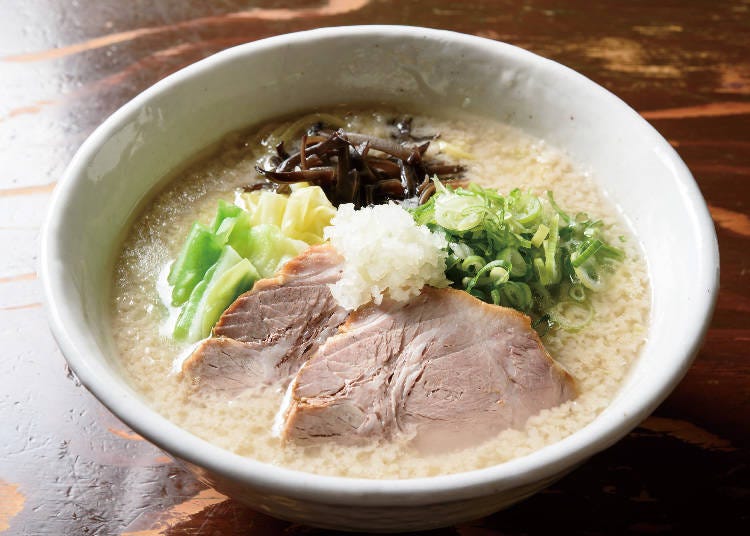
One special trait of this ramen is the white globules of collagen inside the soup, and is a signature menu item. The white globules of collagen are actually from pork fat.
"I was thinking, I wanted to make a creamy and viscous soup, so I added pork lard into paitan, which is white pork bone broth. The secret to adding an umami taste without any strong smell, is to use high-quality lard. Our specialty is that we use a pressure cooker to cook it," shop owner Mr. Ōmura enlightens us.
"With good quality ingredients and meticulous preparation, you can strongly feel the thickness and umami in the taste of the tonkotsu ramen," praises Mr. Tada.
The thick and straight noodles served with the soup, in contrast to what it looks like, is not greasy and lackluster, but instead has a whole flavor that is creamy with a hint of sweetness. The thickness of the shōyu-dare sauce also brings out the pork bones' flavor even more, and before you know it, you'll be slurping the soup down completely.
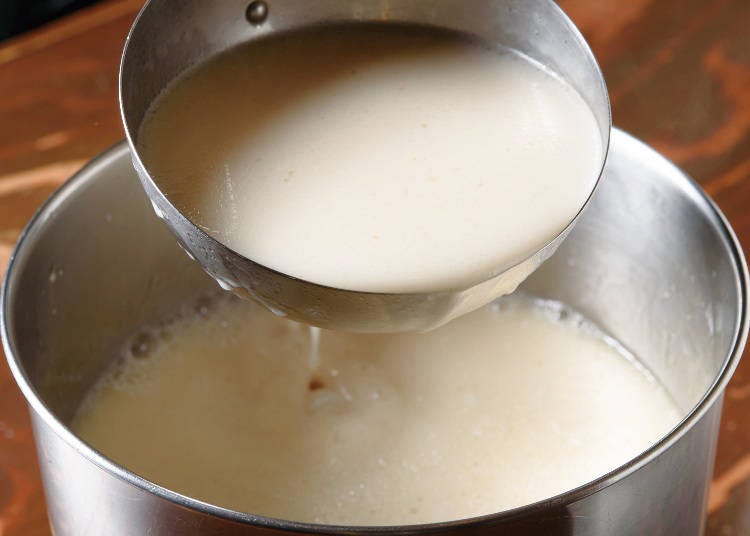
The special pork bone paitan soup uses both pork and chicken bones, and is made by boiling them over a fire for over ten hours, alternating between strong and weak flames.
During that time, excess grease is removed, leaving a glistering white, thick, and creamy soup. It can be said to be a "thick, yet easy to eat" type of ramen, known as a "kossari" type base.
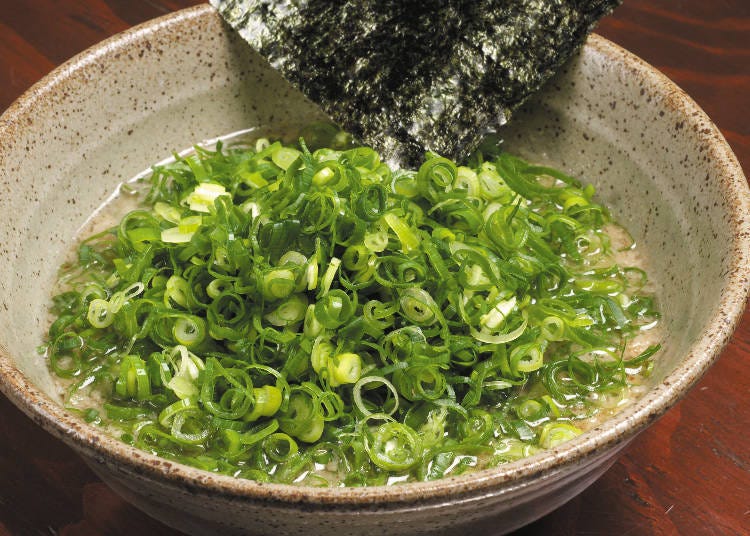
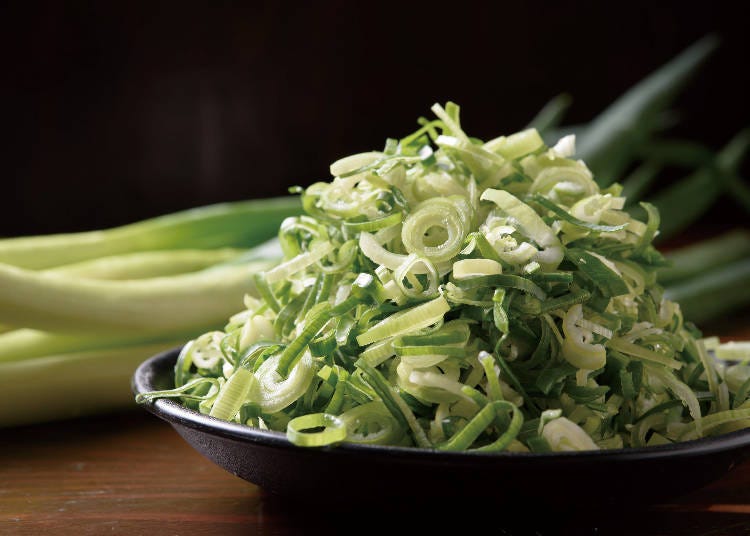
Another popular dish is the Negidaku Ramen, topped with a mountain of spring onions, called negi in Japanese.
The negi used is the Kujō-negi variety, grown in Kyoto. Kujō-negi have many green parts, and as it has a strong sweetness, even if you add a large amount of negi, the spiciness can be easily controlled. Having the soup together with the noodles, has not just an accent on the texture and flavor, but the ramen's tastiness is heightened this way.
At Yamaarashi, besides shiro soup, there is a seafood soup called "umi soup", made by adding fish flakes to pork bone broth to give a seafood flavor. You can choose either shiro soup or umi soup with the negidaku.
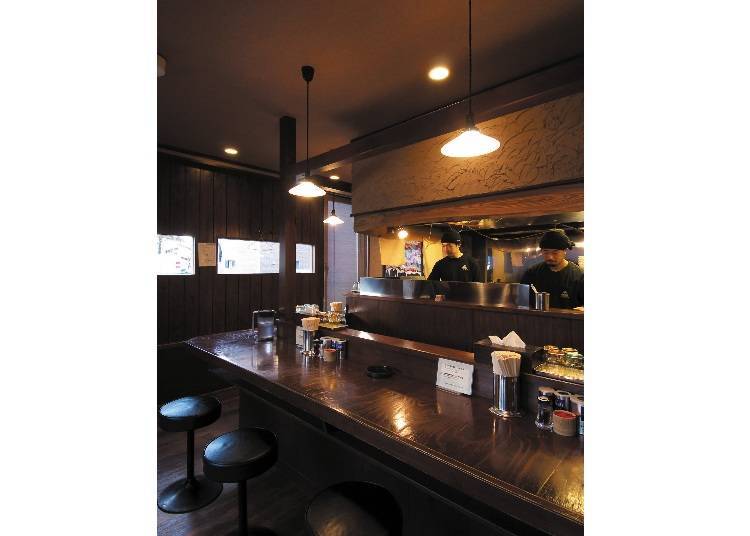
The shop interior has a natural and calming atmosphere, and many solo patrons come regardless of gender. As it is well-known for its unexpectedly easy to eat food, older patrons frequently come as well. Definitely do try out this dish with strong character.
Measures in place against Covid-19:
- Disinfection of shop interior and facilities
- Disinfection between guest rotations
- Disinfectant available for use
- Regular ventilation
- Use of separation boards between seats
- Staff required to use masks, wash hands, disinfect, gargle, and have their temperatures taken
- Social distance maintained between seats and tables
-
Yamaarashi札幌ラーメン 山嵐 本店
- Address 9-6-1, Hiragishi 1-jo, Sapporo-shi, Toyohira-ku, Hokkaido, 062-0931
- Phone Number 011-815-3030
Business hours: 11:30 a.m. to 4:00 p.m., 5:00 p.m. to 8:00 p.m.
Closed on Mondays
Parking spaces: 7
2. Men Dokoro Maruha BEYOND: Smooth noodles that slide down your throat, and soup thick with umami
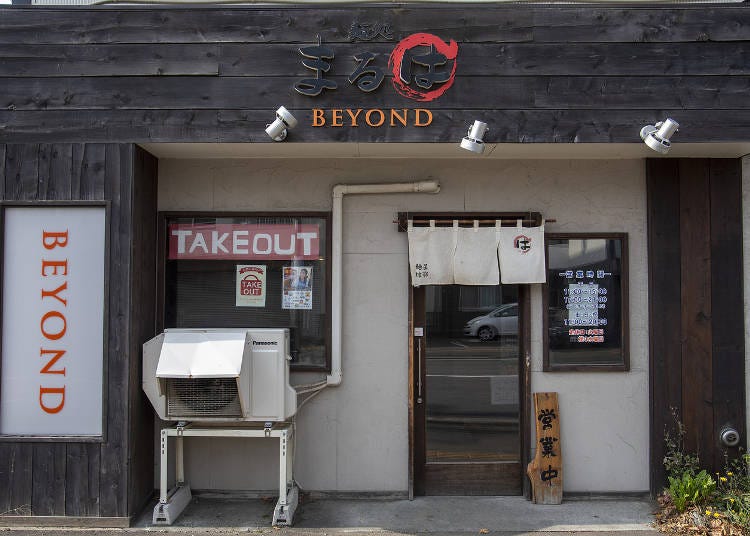
The nearest station is one stop before Hiragishi, and a five-minute walk away from the Municipal Subway's Naka-no-Jima station is Men Dokoro Maruha BEYOND, a shop that opened in 2013 and immediately exploded in popularity.
"The shop's story is that the young shop owner, hoping to follow in his father's footsteps, who also happens to be a well-respected figure in the world of Sapporo ramen as a legend, aims to create his own flavor and surpass his father," Mr. Sugawara explains.
The shop's name comes from his late father's original shop name, Men Dokoro Maruha, and adds a "BEYOND" as the owner hopes to surpass the original.
Since opening the shop, it aims to continue the spirit of making "ramen that you can never get tired of, that anyone can love". However, this isn't a nostalgic taste from the past, but a flavor that carries its own unique impact.
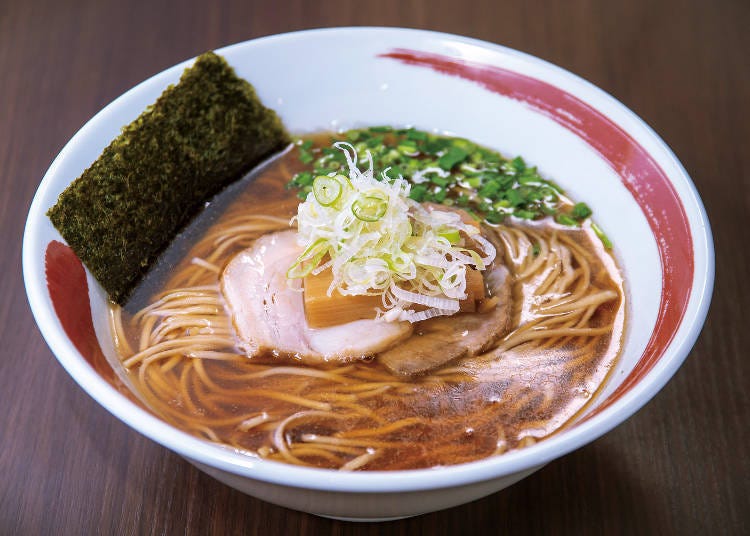
"Amongst the increasing number of lightly flavored soups in Sapporo, this is amazingly delicious," Mr. Sugawara praises this dish. Once the dish is set before your eyes, the steam wafts up with the smell of the fish stock.
However, when you drink the soup, what stands out isn't the taste of the fish, but the mellow yet mildly sweet flavor of the soy sauce, alsong with a strong taste of different notes of umami.
The clear chintan soup is made with pork bones, chicken bones, and various vegetables and blended with a fish stock made of dried seafood such as anchovies, saury, and mackerel, to create a well-balanced soup, and its true value is as a soup which anyone can easily find delicious.
The noodles used are specially ordered from a noodle maker in Kyoto, and it is a straight noodle that is not very long due to the special way it is cut. As you feel the noodles slide down the back of your throat, you'll find yourself surprised by how smooth and easy it goes down your throat. Though it seems simple on the outside, there is a lot of detail that goes into this dish.
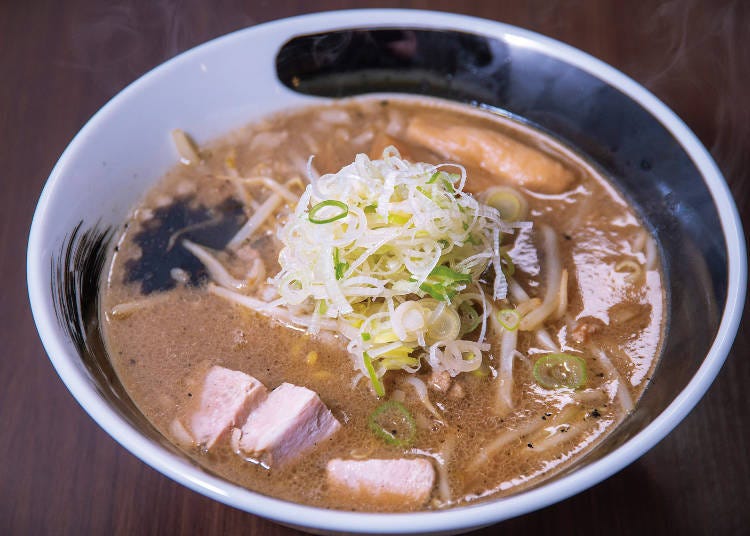
Miso and salt flavored ramen are popular too. The Seabura Miso uses lard stir-fried in a Chinese-style wok with garlic, onions, and bean sprouts, and added into a chintan soup with miso-dare sauce, to create this staple Sapporo miso ramen. This dish is complemented by curly medium-thick egg noodles made in Kyoto.
Together with the aromatic and fruity miso soup, these unique noodles result in a delicious taste with character. The splash of mayu oil added just before serving ups the flavor, and it is fragrant despite being light, resulting in this soup that you'll finish to the last drop.

"Ramen lovers are of course a given, and from businessmen to the elderly who live nearby and families with their children, a wide range of customers come here," we spoke with the manager Mr. Satō Ryōichi.
The shop owner Mr. Hasegawa Ryōma is at the second brand "Men Dokoro Maruha RISE", which opened in 2017 at Sumikawa station, which is two stops away, creating new flavors, so if you're interested in trying out the food there, do drop by for a bite.
Measures in place against Covid-19:
- Disinfection of shop interior and facilities
- Disinfection between guest rotations
- Disinfectant available for use
- Regular ventilation
- Staff required to use masks, wash hands, disinfect, gargle, and have their temperatures taken
- Social distance maintained between seats and tables
-
Men Dokoro Maruha BEYOND麺処 まるはBEYOND
- Address 3-7-8, Nakanoshima 1-jo, Sapporo-shi, Toyohira-ku, Hokkaido, 062-0921
- Phone Number 011-812-0688
Business hours: 11:00 a.m. to 3:00 p.m., 5:00 p.m. to 9:00 p.m. (last order at 8:45 p.m.), Saturdays, Sundays, and public holidays from 11:00 a.m. to 8:00 p.m.
Closed on Tuesdays and the third Wednesday of each month
Parking spaces: 4
3. Ramen Tsukemen NOFUJI: Soup brimming with the umami of pork and fish and extra-thick noodles for a lasting impression
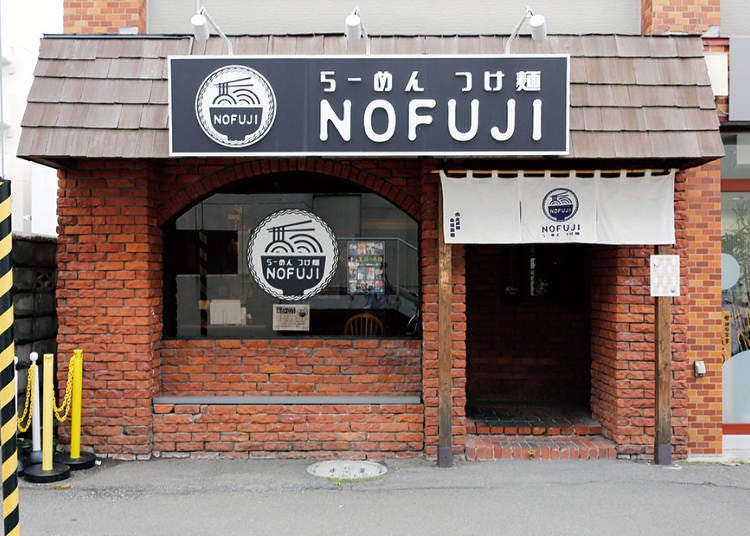
Located one minute away from the Municipal Subway's Namboku line's Minami-Hiragishi station. In this excellent location is Ramen Tsukemen NOFUJI.
With regular ramen, which has noodles served inside soup, and tsukemen, noodles served separately from the soup and eaten by dipping them in soup, both available, it's a popular shop with many fans.
The shop owner honed his skills at a popular tsukemen shop in Sapporo, and together with his cheery wife, the shop is run by the husband-and-wife pair. Their hospitality towards patrons is highly rated too.
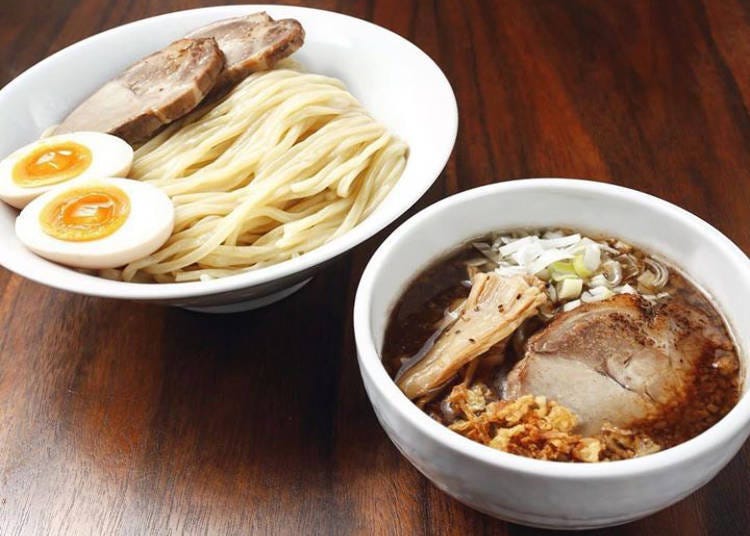
Mr. Tada's first recommendation is the Tsukemen. "The thick pork bone broth and fish broth are blended into a balance that is mild and light. It's a flavor that anyone can enjoy," he praises.
The mellow soup has sweetness and acidity carefully adjusted, and the chewy noodles are specially ordered, being made from wheat produced in Hokkaido. Once you dip the noodles into the soup, the flavor of the fish stock wafts out gently. Add "soup wari", a light soup, to the thick leftover tsukemen soup, and do taste every last drop of it.
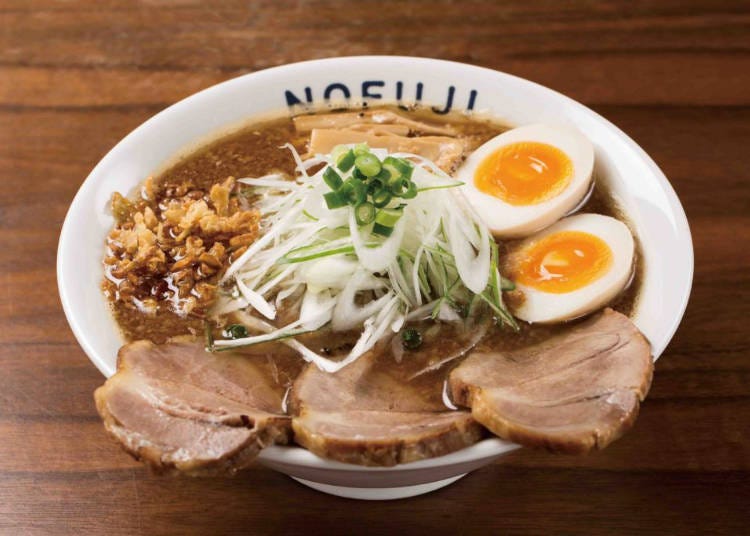
The Tokusei Gyōsuke Shōyu Ramen, which uses the same soup base as the tsukemen, is another dish to look out for.
The Shōyu-dare sauce is made specially for ramen, and with a smooth aftertaste, this is a soup that you'll finish until the last drop. To really get the full flavor profile, it's recommended to get the Tokusei Gyōsuke Shōyu ramen with three slices of chashū pork.
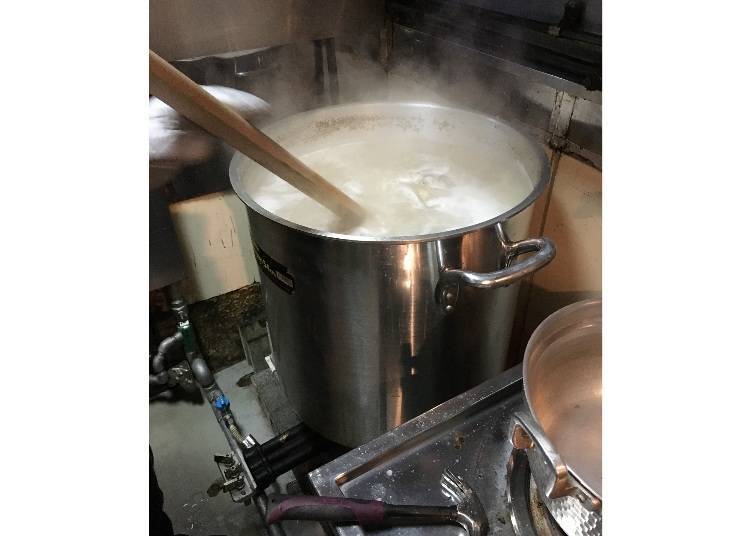
The soup base uses pork knuckles, backbones, and heads, which are boiled for 10 hours, and dried anchovies, konbu seaweed, and fish meal are added, then boiled for 16 hours. The white paitan soup is known for having a flavor that is both thick and rich, yet mild without any overbearing taste.

The shop interior leaves a strong impression, with red brick walls and unique flooring. You can enjoy your food in the laid-back atmosphere. However, there may be queues, especially during lunch hours.
Measures in place against Covid-19:
- Disinfection of shop interior and facilities
- Disinfection between guest rotations
- Disinfectant available for use
- Regular ventilation
- Use of separation boards between seats
- Staff required to use masks, wash hands, disinfect, gargle, and have their temperatures taken
-
Ramen Tsukemen NOFUJIらーめん つけ麺 NOFUJI
- Address 13-7-12, Hiragishi 3-jo, Sapporo-shi, Toyohira-ku, Hokkaido, 062-0933
- Phone Number 011-815-0101
Business hours: 11:00 a.m. to last order at 3:00 p.m., 5:00 p.m. to last order at 9:00 p.m. (closes when soup is finished)
Closed on Mondays (if Monday is a public holiday, the shop will close on the following day)
Parking spaces: none
4. Menya Kei: Umami created from carefully prepared prawn and miso to create ramen with a new taste
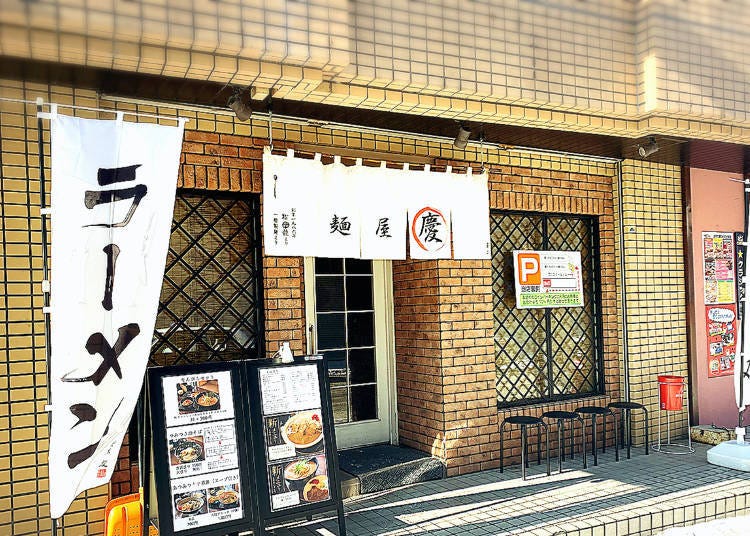
Next to Hiragishi, along the west exit of the Municipal Subway's Namboku line's Minami-Hiragishi station, is Menya Kei. The owner honed his skills at a famous Sapporo ramen shop, and even has experience with Italian food, creating ramen with both great sense and skill.
The signature dish is the "Ebimiso". Though many shops use prawns as an ingredient in their ramen, the taste here is entirely new and unlike any other shop. It's a dish particularly popular amongst the ladies.
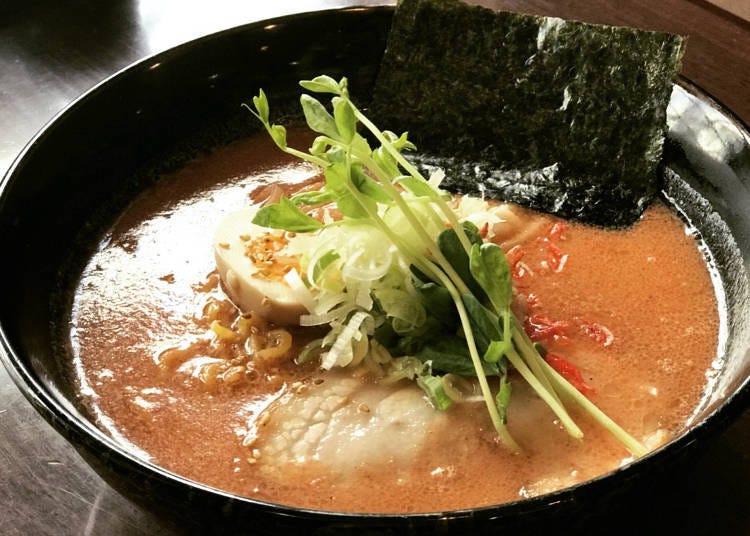
This is the most popular dish on the menu, the Koku Fukai Ebi Miso. "The recipe uses Italian cuisine techniques and removes the strong smell of the prawns while drawing out the smooth umami taste," another dish that Mr. Tada recommends.
From the very first bite you can taste the excellent flavor of the prawns embracing you. As you continue eating, you'll find that between the prawn and the miso, neither flavor stands out on top of the other, but instead come together to create an umami of "prawn miso".
With its clear taste, you'll drink this soup to the very last drop.
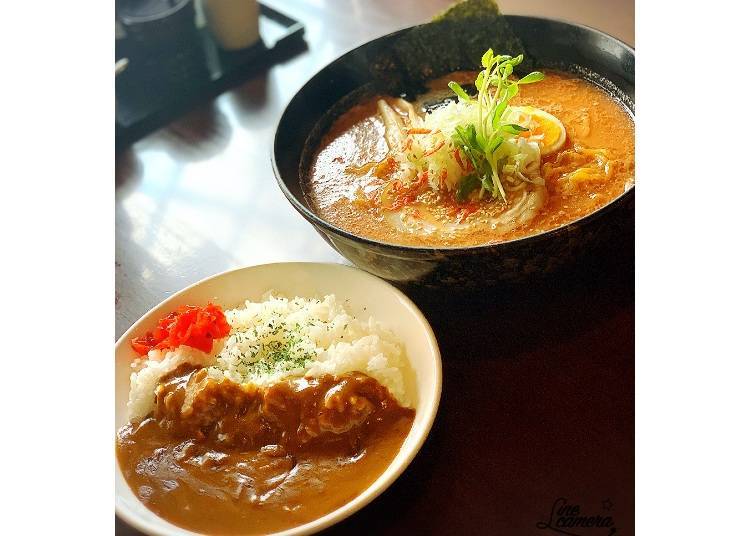
On days when you're absolutely famished, the ramen and mini rice bowl set is recommended. In particular, the shop's original curry, which is boiled for extended lengths of time, is especially popular, and though you can order it a la carte, it comes in a mini size with the set menu as well. When ordering it a la carte, upsizing is free.
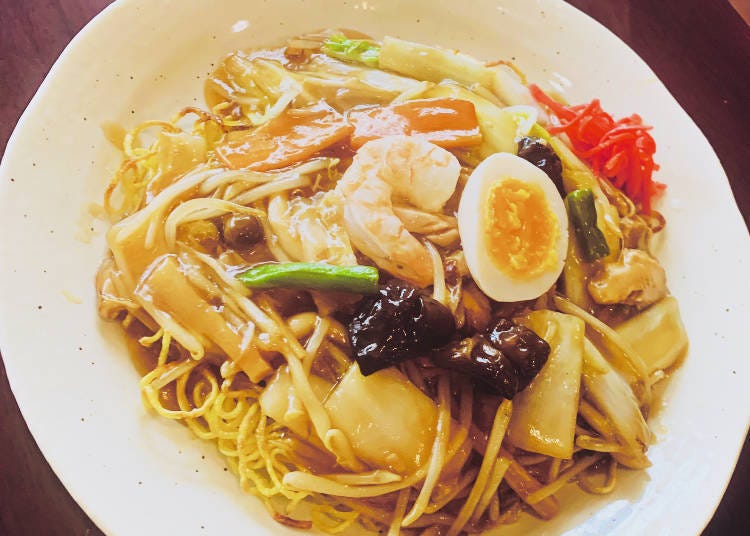
The Ankake Yakisoba is a new menu item served with piping hot toppings. It became popular very quickly. There is also a specially created "Wasei Gobō Miso" ramen, and it can be difficult to pick what you're going to eat.
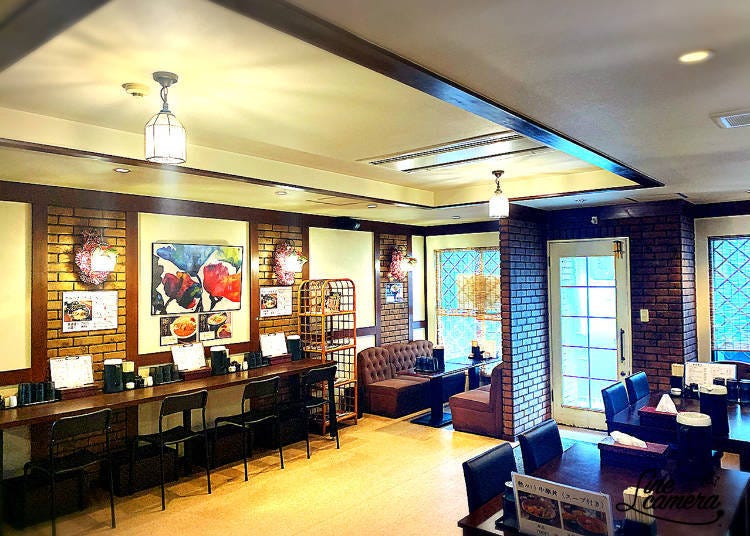
The shop interior leaves a large space in the center to create a spacious feeling, and has a layout with ample space between tables. With an atmosphere reminiscent of a coffee shop, it can leave you feeling somewhat nostalgic. It's a popular shop with patrons of all ages.
Measures in place against Covid-19:
- Disinfection of shop interior and facilities
- Disinfection between guest rotations
- Disinfectant available for use
- Regular ventilation
- Social distance between tables and seats
-
Menya Kei麺屋 慶
- Address 13-7-7, Hiragishi 3-jo, Sapporo-shi Toyohira-ku, Hokkaido, 062-0933
- Phone Number 011-817-7870
Business hours: 11:00 a.m. to 3:00 p.m., 5:00 p.m. to 9:00 p.m. (closes when the soup is finished)
Closed on Wednesdays and the third Thursday of the month
Parking spaces: 2 (if the coin parking lots nearby are used, 10% discount will be given at the register)
(*Ed. Note: As of July 2021, this shop has closed permanently.)
5. Wadashichūka SOBA Yamawasabi: A new flavor made by the marriage between traditional Japanese Washoku and ramen
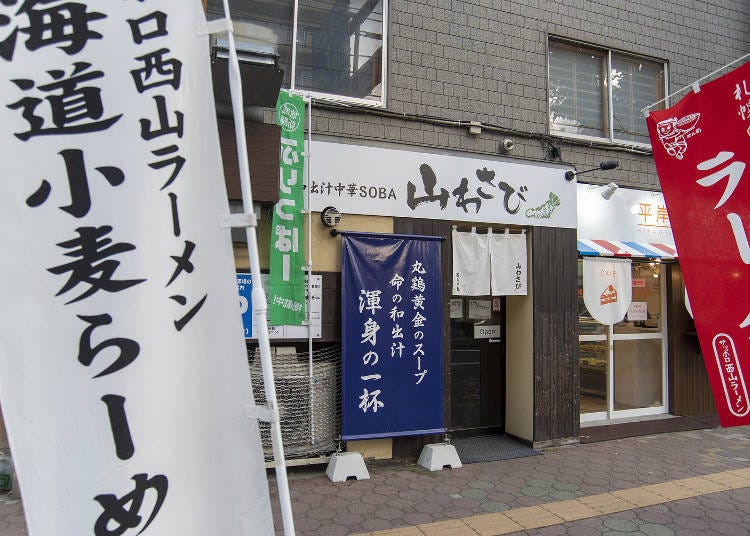
Newly opened on March 26th, 2020, is Wadashichūka SOBA Yamawasabi. Located facing National Highway 453, often called Hiragishi-dōri, it is about five-minutes away from the Municipal Subway's Namboku Line's Hiragishi station by foot.
The ramen on display at the shop entrance, "Marudori-ōgon", said to be "Inochi-no-Wadashi", the soup of life, and "Kohshin-no-ippai", the whole-bodied soup, it uses ingredients and herbs from Hokkaido, to create a flavor that you can only taste here.
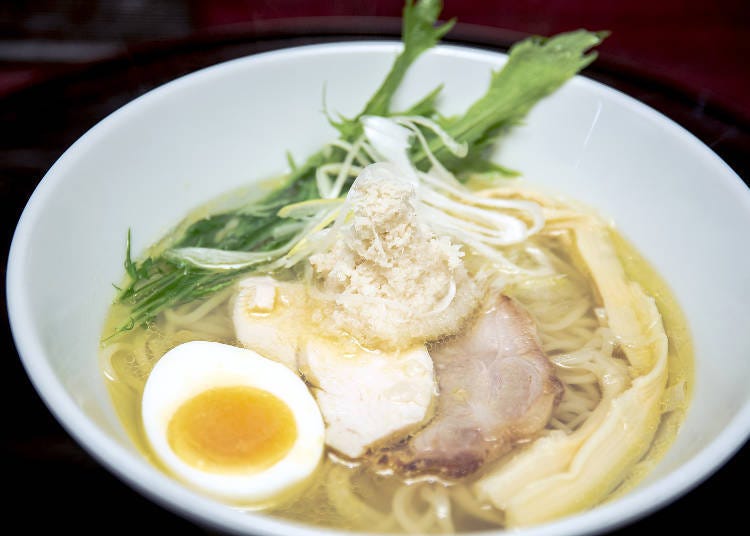
"The shop owner is a chef of Washoku, or traditional Japanese food, and he creates ramen with a deep taste using ingredients normally used in Washoku. To taste this unique quality, please taste the shio ramen first," says Mr. Sugawara as he recommends the Yamawasabi Chūka SOBA (Shio).
The light gold and clear soup, uses a chicken stock as the base soup, with konbu seaweed, bonito flakes, and Washoku ingredients such as frigate mackerel, a close relative of the bonito, as well as horse mackerel, all blended together.
The resulting flavor can be said to be like the fragrance given off by top-class aromatics, which you can slowly feel permeating your body.
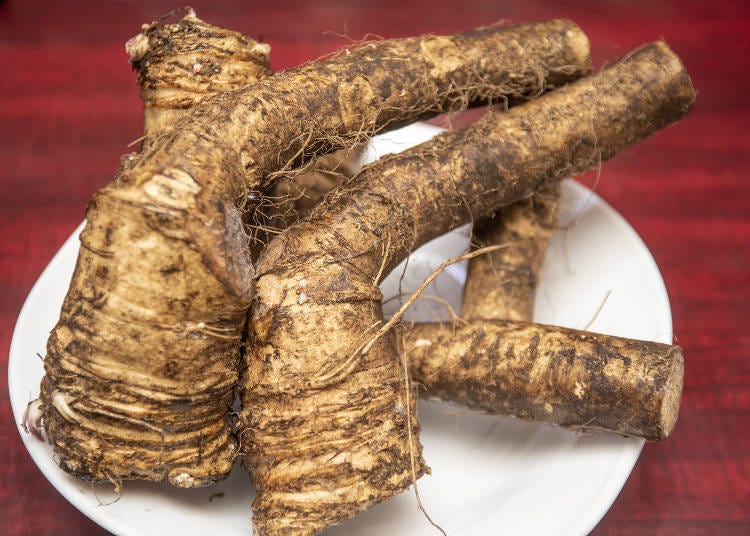
Topping the center of the bowl is the herb, Yamawasabi. It's an ingredient mainly used in Hokkaido cuisine, and it is known for its characteristic spiciness that emanates from the nose, and its refreshing taste.
With the hope of "spreading the food culture of Hokkaido", besides having it in the shop name, the signature items in the menu make use of this herb as well. The Yamawasabi melts into the soup as you eat, slowly turning it into a flavorful yet sharp and great soup.
From the chicken breast chashū, which is seasoned with shio kōji marinade and cooked over low temperatures, and from the pork chashū which is bursting with the umami of meat, to the braised menma bamboo shoots, each and every topping is specially selected and crafted by the chef.
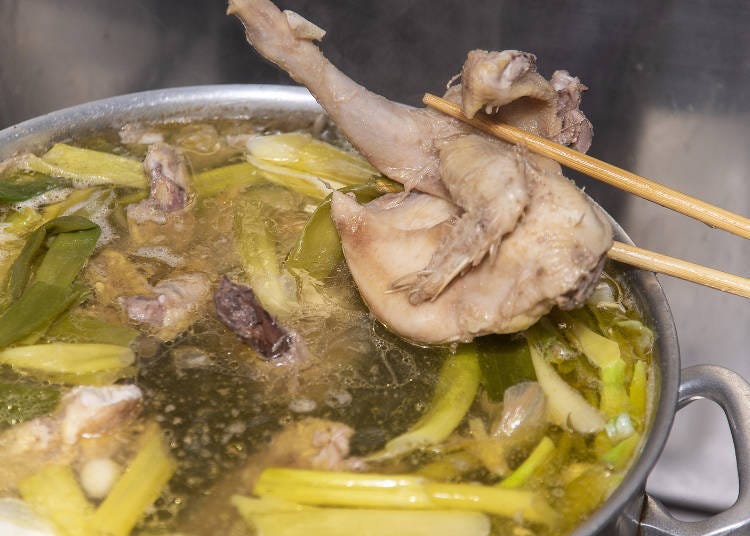
The beautifully clear soup is carefully prepared using whole chicken, chicken bones, as well as fragrant vegetables. Depending on the dish, soup stock made from sea bream, duck, and clams are also blended together for a wide variation of soups.
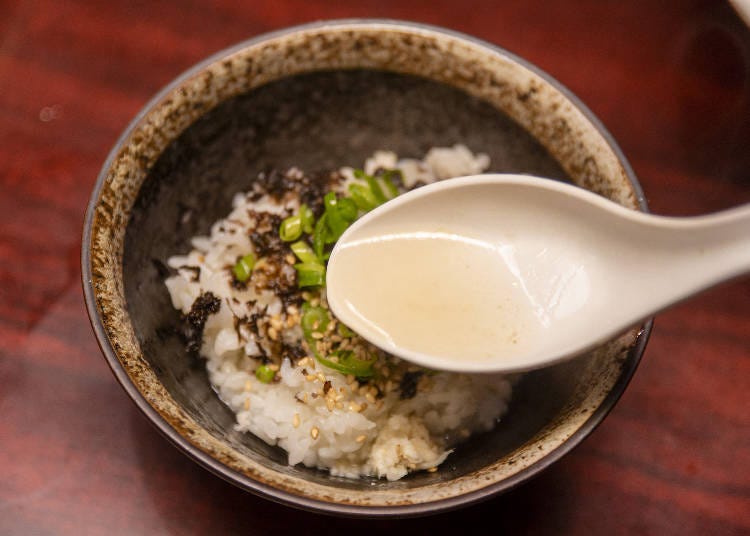
After you've tried the ramen, it's recommended to try out the "Yamawasabi Ochazuke". Yamawasabi, iwanori seaweed, white sesame, and spring onion top a bed of rice, which you pour your leftover soup over, allowing you to eat it like ochazuke, which is rice with tea poured over it.
As you can enjoy the leftovers of your ramen to the very end, it's a great way to end your meal. As the rice portion is small, you should be able to finish it completely.
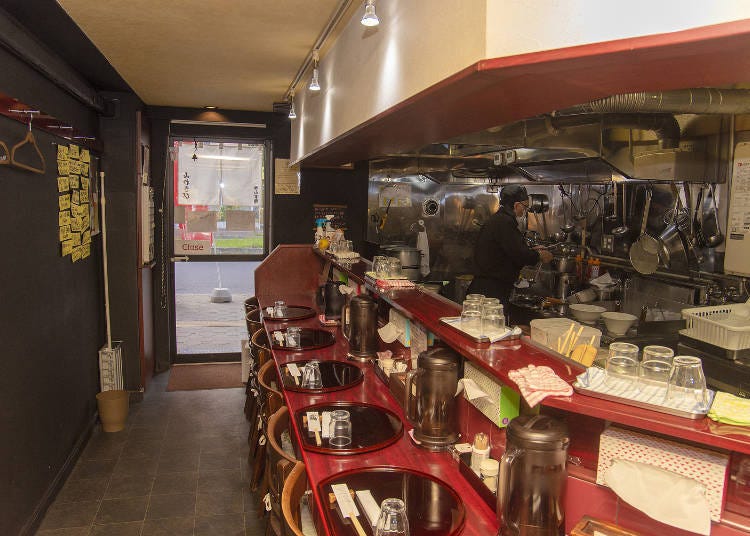
The shop has counter seats only. At each seat is a "Hangetsu-bon", often used in Washoku, giving the shop a high-class atmosphere.
Measures in place against Covid-19:
- Disinfection of shop interior and facilities
- Disinfection between guest rotations
- Disinfectant available for use
- Regular ventilation
- Use of separation boards between seats
- Staff required to use masks, wash hands, disinfect, gargle, and have their temperatures taken
-
Wadashi Chuka SOBA Yamawasabi和出汁中華SOBA 山わさび
- Address 9-9-18, Hiragishi 3-jo, Sapporo-shi, Toyohira-ku, Hokkaido, 062-0933
- Phone Number 090-5071-5570
Business hours: 11:00 a.m. to 9:00 p.m. (closes when soup is finished)
Closed irregularly
Parking spaces: 2
Text by: Minna no Kotobasha
* The information in this article is as of December 2020.
Minna no Kotoba Sha is a production company founded by an editor with extensive experience in editing local magazines in Sapporo. For over 20 years, our team has conducted research and written articles across Hokkaido, with Sapporo as our primary hub. Our diverse portfolio includes the production of various books such as travel guides, informational magazines, and collections showcasing the picturesque landscapes of Hokkaido. Comprised entirely of women, the team at Minna no Kotoba Sha boasts diverse interests, including a passion for travel, culinary delights, and alcoholic beverages. The scope of our communication efforts spans a wide range, covering everything from introducing notable restaurants to providing coverage of local events and sharing stories of leisure experiences.
- Area
- Category
*Prices and options mentioned are subject to change.
*Unless stated otherwise, all prices include tax.
Popular Tours & Activitiess
Recommended places for you
-

Sappororamen Genten Sono2
Ramen
Sapporo / Chitose
-
Appealing

Shiroi Koibito Park
Theme Parks
Sapporo / Chitose
-

Former Hokkaido Government Office Building (Red Brick Office)
Other Historic Sites
Sapporo / Chitose
-
Appealing

Sapporo Ramen Yokocho
Ramen
Sapporo / Chitose
-
Appealing

Rukku and Uohei
Izakaya
Sapporo / Chitose
-
Appealing

Asahiyama Zoo
Zoos, Aquariums & Botanical Gardens
Asahikawa
-

Jozankei Onsen: 10 Luxurious Hotels with Private Hot Springs & Stunning Views Near Sapporo
by: Robotan
-
Ad

Welcome to Sapporo! Here’s How to Expore the Ciy Like a Local
-
Ad

Sapporo SATUDORA Shopping Guide: Get Souvenirs, Medicine & More at This Iconic Drugstore (Special Deal Inside!)
-

Explore Japan in 7 Days: The Ultimate Local Rail Adventure with the Hokkaido & East Japan Pass
by: Guest Contributor
-

BIGGEST SALE ALERT! SATUDORA Tax-Free Winter Sale: Stack Coupons for Massive Savings!
by: Guest Contributor
-
Ad

Smart Ways to Avoid Crowds and Enjoy a Safe, Comfortable Trip to Otaru.
-

JR Edition: Visit all of Tokyo in one Day with the Tokyo Metropolitan District Pass!
-

Northern Ramen Locals Love: 3 Asahikawa Ramen Shops That Will Make You Forget All Your Troubles
by: Nobuka Kawashima
-

Hakodate Ramen: 3 Must-Try 'Shio' Ramen Shops That'll Make You Never Want To Leave Japan!
-

Top 5 Things to Do in Hokkaido's Biei and Furano Area: Shirogane Blue Pond, Lavender Fields, And More!
-

Ultimate Tokyo Transit Guide: JR, Subways, and Private Railways Explained, Plus Suica/PASMO and Money-Saving Passes
-

Top 6 Ramen Shops in Odori: The Birthplace of Sapporo Ramen
- #best sushi hokkaido
- #things to do hokkaido
- #best ramen sapporo
- #what to bring to japan
- #new years in tokyo
- #what to buy in ameyoko
- #japanese nail trends
- #what to do in odaiba
- #onsen tattoo friendly tokyo
- #daiso
- #best sweets otaru
- #japanese fashion culture
- #best nature furano
- #japanese convenience store snacks
- #best japanese soft drinks













